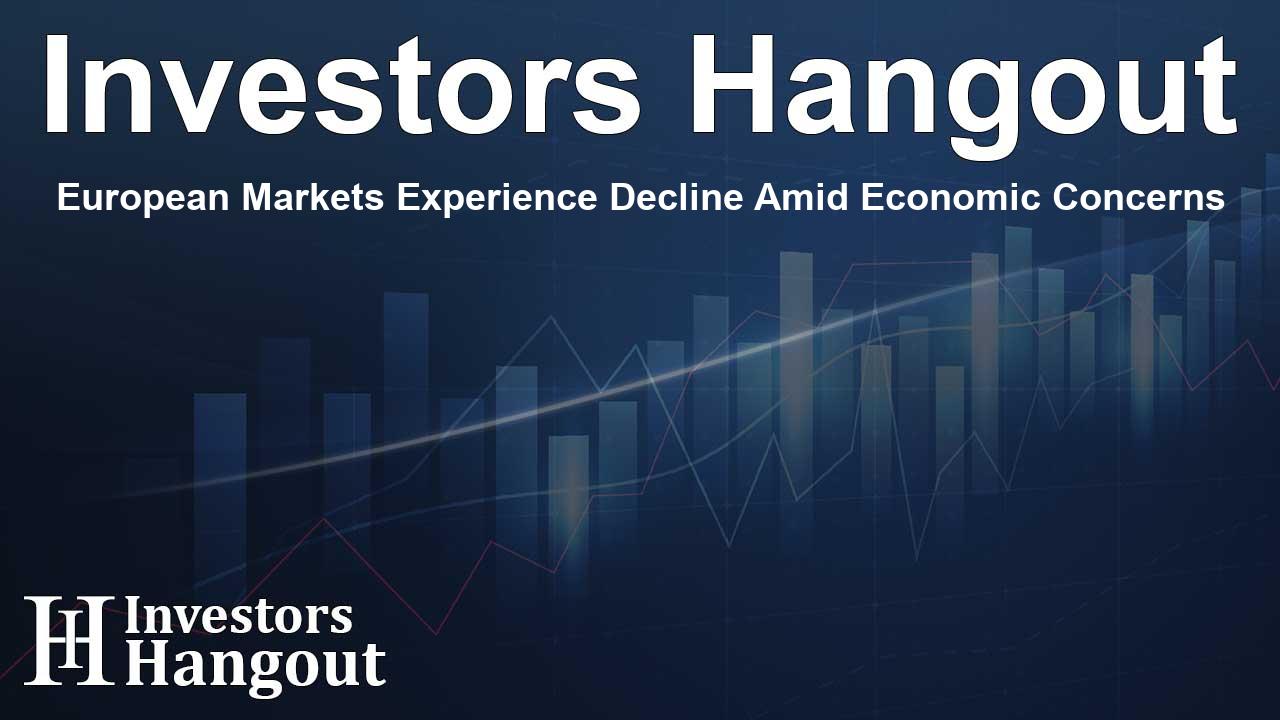European Markets Experience Decline Amid Economic Concerns

Market Overview
European stock markets have started the week on a negative note, reflecting investor anxiety regarding the global economy and anticipated policy changes by central banks. Recent data has stoked concerns over inflation and economic stability, triggering a wave of caution among investors.
Central Banks Under Scrutiny
As we look at recent trading trends, European equities ended the previous week lower after a surprising uptick in the US jobs report heightened fears that the Federal Reserve may not be as quick to lower interest rates as previously thought. This sentiment has carried over into Monday’s session, with traders on edge about potential interest rate hikes from the Fed, especially if economic policies introduced by key government officials lead to increased trade tariffs and tax adjustments.
The European Central Bank (ECB) faces a delicate balancing act. While there's room for further monetary easing, ECB chief economist Philip Lane emphasizes the necessity of finding a middle ground that avoids inducing a recession while effectively managing inflation. According to Lane, an aggressive drop in interest rates could hinder efforts to control inflation in service sectors. He noted, "If interest rates fall too quickly, it will be difficult to bring services inflation under control," highlighting the seriousness of the ECB's situation.
Upcoming Inflation Data
In the midst of these concerns, traders are keenly awaiting inflation data, particularly the US Consumer Price Index (CPI) set to release midweek. The backdrop of this anticipation is the Fed's recent meeting minutes, which revealed ongoing concerns among policymakers about inflation pressures. Investors are also scrutinizing inflation metrics within Europe, particularly from the UK, as these will play a critical role in shaping market sentiment following last week’s drop in UK government bonds.
Corporate Moves
In corporate news, GSK (LON: GSK) recently announced plans to acquire Boston-based IDRx for up to $1.15 billion, focusing on developing treatments for rare tumors. Despite this aggressive move, GSK’s stock recently saw a decrease of 0.7% in the markets.
In contrast, Porsche (ETR: PSHG_p) saw an increase in stock price of 1.5% after reporting a significant 28% decline in sales from China for the upcoming year, showcasing investor confidence amid challenges. This resilience is noteworthy as global corporations adjust to fluctuating economic conditions.
Looking across the Atlantic, major US banks including JPMorgan (NYSE: JPM), Wells Fargo (NYSE: WFC), Citigroup (NYSE: C), and Goldman Sachs (NYSE: GS) are gearing up to announce their fourth-quarter earnings. Observers are eager to see how these reports reflect the financial instability that has characterized recent months.
Oil Market Dynamics
In commodity markets, oil prices have seen an uptick following news of additional US sanctions on Russian oil producers and shipping. The WTI crude futures surged 1.5% to $76.90 a barrel, while Brent crude prices rose by 1.6% to $81.06 a barrel. As prices have increased over 6% since the announcement of sanctions, this effectively reshapes the supply dynamics of crude oil, potentially forcing major importers like China and India to seek alternative sources.
Overall, European markets are navigating through a complex landscape characterized by inflation concerns, central bank policies, and fluctuating global trade conditions. As investors brace for upcoming economic data and earnings reports, the potential for volatility remains high, making this a critical time for market watchers and participants alike.
Frequently Asked Questions
What factors influenced the decline in European stocks?
The drop in European stock values is attributed to concerns about the global economy, inflation pressures, and the future policies of central banks, particularly the Federal Reserve.
How did the Federal Reserve's actions impact the markets?
Recent reports indicating a stronger job market in the US raised fears that the Federal Reserve might not initiate further interest rate cuts, contributing to unsettled market conditions.
What is the ECB's approach to managing inflation?
The ECB aims to balance easing policies with the need to control inflation, ensuring that rates do not drop too quickly while also avoiding prolonged high rates.
What earnings reports should investors watch for?
Investors should closely watch earnings reports from major US banks like JPMorgan, Wells Fargo, Citigroup, and Goldman Sachs, as they may provide insights into the overall economic climate.
How do recent sanctions affect oil prices?
The newly imposed US sanctions on Russian oil have pushed oil prices higher as they potentially limit supply, causing major importers to seek crude from other sources.
About The Author
Contact Lucas Young privately here. Or send an email with ATTN: Lucas Young as the subject to contact@investorshangout.com.
About Investors Hangout
Investors Hangout is a leading online stock forum for financial discussion and learning, offering a wide range of free tools and resources. It draws in traders of all levels, who exchange market knowledge, investigate trading tactics, and keep an eye on industry developments in real time. Featuring financial articles, stock message boards, quotes, charts, company profiles, and live news updates. Through cooperative learning and a wealth of informational resources, it helps users from novices creating their first portfolios to experts honing their techniques. Join Investors Hangout today: https://investorshangout.com/
The content of this article is based on factual, publicly available information and does not represent legal, financial, or investment advice. Investors Hangout does not offer financial advice, and the author is not a licensed financial advisor. Consult a qualified advisor before making any financial or investment decisions based on this article. This article should not be considered advice to purchase, sell, or hold any securities or other investments. If any of the material provided here is inaccurate, please contact us for corrections.
